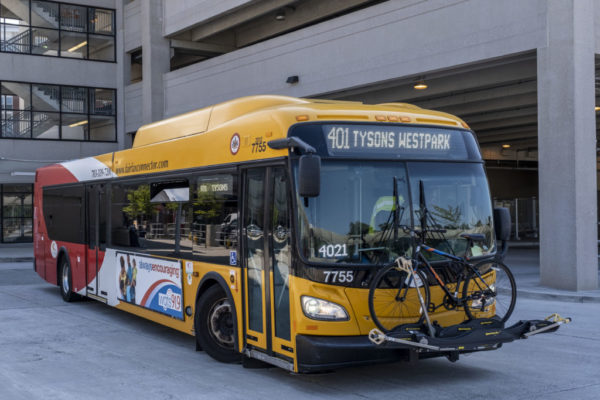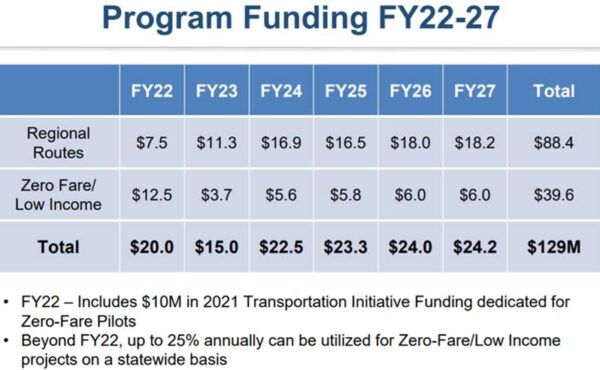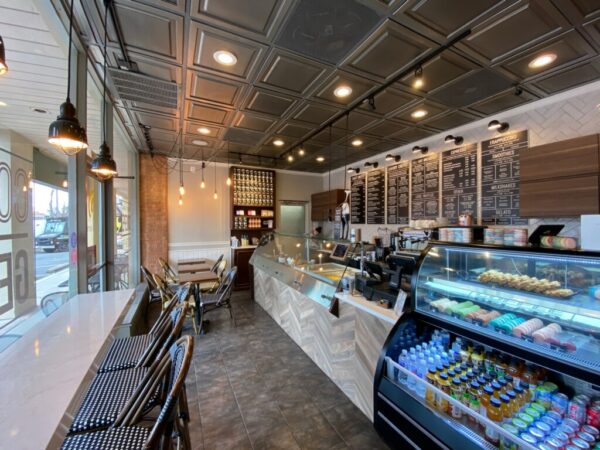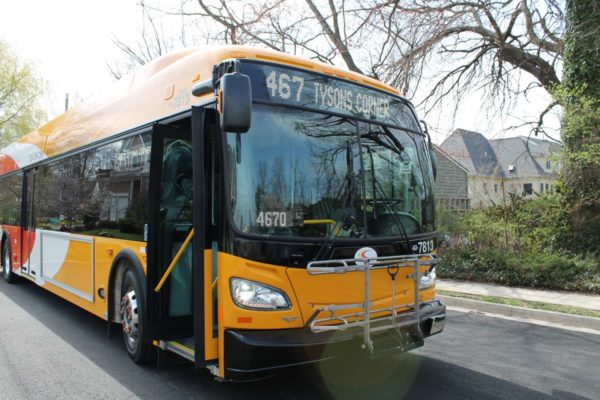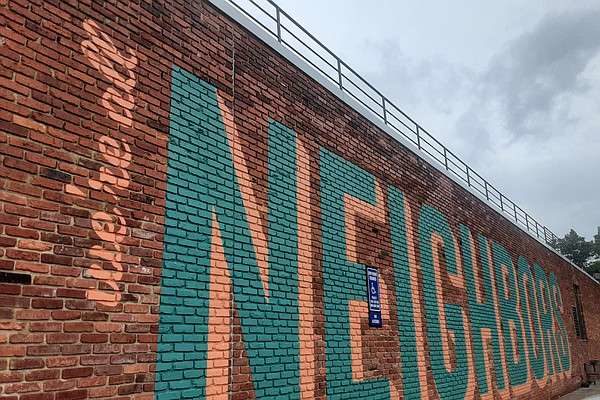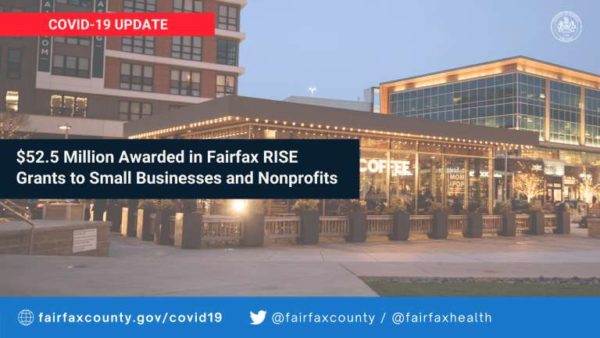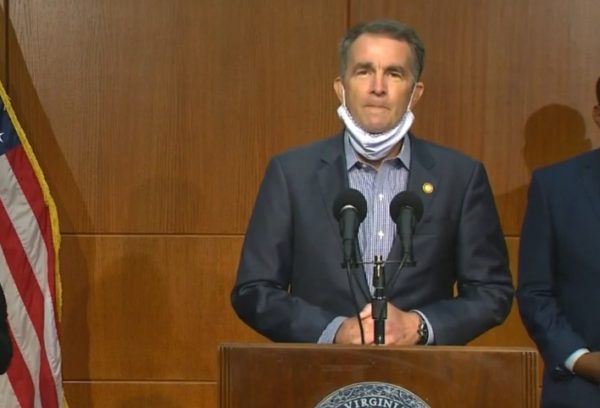Fairfax Connector suspended fare collections last year as a temporary health measure in response to the COVID-19 pandemic, but the public bus system is considering longer-term adjustments to its fare policies with support from a new state grant program.
The Fairfax County Department of Transportation is one of 12 transit agencies in Virginia that have expressed interest in the Department of Rail and Public Transportation’s new Transit Ridership Incentive Program (TRIP), which will fund projects that increase connectivity in highly populated areas or remove barriers for low-income individuals by reducing or eliminating fares.
While fare collection resumed on Jan. 4, county leaders see reducing or subsidizing trip costs as one way to encourage more people to ride the Connector, which is the largest local bus system in Northern Virginia, transporting approximately 30,000 passengers on 91 routes in ordinary times.
“Access to transit is crucial in promoting equity county-wide and for many a barrier is cost,” Fairfax County Board of Supervisors Jeff McKay said. “Our Department of Transportation is committed to looking into how we can provide aid to those experiencing economic hardship.”
Created by the General Assembly during its 2020 session, TRIP was conceived before the novel coronavirus arrived in the U.S., but Virginia Transportation Secretary Shannon Valentine told the Commonwealth Transportation Board during a May 18 workshop that the pandemic illustrated how vital public transportation is for essential workers, DCist reported.
“Fares turned out to be an obstacle. So we are really trying to use this as an opportunity,” Valentine said, according to DCist.
DRPT has split TRIP into two programs: one focused on regional connectivity, which could include everything from integrated fare collection systems to the creation of bus-only lanes on significant routes, and one focused on reducing the impact of fares on low-income users, which could involve eliminating fares, creating zero-fare zones, or providing subsidized or free passes.
Virginia has allocated a total of $129 million to the TRIP initiative through fiscal year 2027, including $88.4 million for the connectivity program and $39.6 million for the fare program, according to a presentation that DRPT delivered to the Commonwealth Transportation Board.
Legislators limited the fare reduction program to 25% of the initiative’s annual funding, but the General Assembly gave the program an additional $10 million in the state’s fiscal year 2022 budget, raising its total to $12.5 million for the upcoming fiscal year, which begins on July 1.
DRPT released a draft policy last week outlining how TRIP will be implemented, including how projects will be evaluated for grant funds. The resolution is open for public input through June 18, and the CTB is scheduled to vote on it on June 23.
The department has also made a draft of the program’s application guidelines available for public comment until July 7. Read More
A crepe restaurant in Vienna and other businesses are easing into changes as Virginia lifts public health restrictions prompted by the COVID-19 pandemic.
With the Centers for Disease Control and Prevention issuing new mask guidance for fully vaccinated people, Virginia has eased its mask mandate, and major retailers like Starbucks and Walmart have also lifted restrictions in stores, but businesses can still impose restrictions.
For the safety of customers and staff, Crepe Amour (407 Maple Ave. E.) in Vienna is still requiring people to mask up.
“You can’t declare a victory before you get to the finish line,” the restaurant’s owner, Sri Suku, told Tysons Reporter.
His business shut down in late March 2020 and reopened in June.
Suku says grants have helped businesses like his survive during the pandemic.
Crepe Amour is one of nine Fairfax County restaurants that recently received a $3,500 grant from the food ordering app DoorDash and the Virginia Restaurant, Lodging & Travel Association, which represents the state’s hospitality industry.
The VRLTA’s 2021 DoorDash Restaurant Operator Relief Grant program gave a total of $450,000 in grants to 128 businesses after over 690 restaurants in the state applied for relief.
The initiative is part of the tech company’s Main Street Strong Pledge philanthropy effort and did not require businesses to be a DoorDash partner to be eligible, the association said.
The grants were intended for restaurants that had their operations disrupted, saw reduced revenue, or experienced financial stress between March and December 2020. To be eligible, businesses had to have no more than three locations with 50 or fewer employees and annual gross revenue of $3 million or less for the specific location that was applying.
The other Fairfax County recipients were Pho 2000, Sully’s Pour House, and Herndon Donuts in Herndon, Reston’s Sprout Cafe, Mazadar Restaurant in Fairfax, and DC Steakholders and Meaza Ethiopian Restaurant in Falls Church.
Eight of the county recipients, including Crepe Amour, also got money from the Fairfax Relief Initiative to Support Employers that the Board of Supervisors established last year to give financial assistance to local businesses and nonprofits.
Suku has used the money for rent, marketing, and other expenses. He says the money is great to help stay afloat and especially helped the catering side of his operations with letting people know they’re back in business.
Under Gov. Ralph Northam’s current public health order, restaurants and other food service venues are limited to 100 people indoors and 250 people outdoors, and different groups of patrons must be kept at least six feet apart. However, the state will end those and other capacity and distancing restrictions on May 28.
While Suku says mask requirements will remain in place, Crepe Amour currently allows outdoor seating, and he plans to reopen indoor seating when Virginia’s capacity and social distancing restrictions end on May 28.
Photo courtesy Sri Suku
Fairfax County is taking a small but crucial first step toward electrifying its sprawling government vehicle fleet, thanks to more than $4 million in state grants.
Gov. Ralph Northam announced on Friday (May 7) that the county will receive $4.4 million from the first round of Virginia’s Clean Air Communities Program, an initiative that launched in November using $20 million from the state’s Volkswagen Environmental Mitigation Trust.
Three of the five awarded grants went to Fairfax County agencies:
- Department of Transportation: $2.9 million for four shuttle buses and chargers
- Department of Public Works and Environmental Services: $1.2 million for four solid waste and recycling trucks and chargers
- Department of Vehicle Services/Department of Procurement and Material Management: $205,275 to purchase a medium-duty truck and charger for the public library system
The other recipients are the Metropolitan Washington Airports Authority, which will get $3.9 million to purchase five shuttle buses and chargers, and Amherst County, which got $998,301 for two trucks, a shuttle bus, and chargers.
“Supporting clean transportation solutions is a vital part of our efforts to combat climate change and improve air quality in the Commonwealth,” Northam said. “These investments will reduce harmful vehicle pollution, which disproportionately impacts marginalized communities, and help accelerate an equitable transition to a cleaner economy for all Virginians.”
Fairfax County will use its grant funds to launch an electric vehicle pilot as part of a broader push to eliminate fossil fuels from the county’s transportation operations and achieve carbon neutrality by 2040.
The county’s Joint Environmental Task Force recommended in October that the Fairfax Connector bus fleet transition to electric vehicles or other non-carbon-emitting alternatives by 2030, followed by public school buses and non-bus vehicles in 2035.
The county has approximately 6,347 vehicles in its overall fleet, including 1,540 Fairfax County Public School buses, according to the Department of Vehicle Services.
While the new pilot will kick off the conversion of the county government fleet, FCPS received its first electric school buses in January from a statewide initiative led by Dominion Energy, which has pledged to replace all diesel buses in the state with electric ones by 2030.
The county first utilized electric vehicles for public transit in November, when the autonomous Relay shuttle kicked off passenger service in Merrifield for a year-long pilot project.
“To cut carbon admissions, we have to reimagine the way in which we travel,” Fairfax County Board of Supervisors Chairman Jeff McKay said. “As a county, we are already actively moving towards cutting our emissions from our public transit and this will move us closer to our end goal.” Read More
Dozens of local artists and arts-oriented organizations got welcome news last week when ArtsFairfax announced the recipients of $567,138 in emergency relief and recovery grants on Jan. 15.
A nonprofit that serves as Fairfax County’s designated local arts agency, ArtsFairfax created an Emergency Relief and Recovery Grants program in order to provide quick funding to an industry that has been devastated by the COVID-19 pandemic.
The program comes in lieu of the agency’s usual grant programs, which were suspended for fiscal year 2021.
“The impact of COVID-19 continues to have a devastating effect on the arts community, yet we have seen the arts continue to provide arts education, senior engagement, family entertainment and so much more,” ArtsFairfax president and CEO Linda S. Sullivan said.
Out of the $108,500 in funding requests that it received, ArtsFairfax has awarded $101,950 in emergency relief grants to 40 different Fairfax County arts organizations. It also raised private funds to support $28,300 in grants to 29 individual artists.
In addition, 39 arts organizations will receive operating support grants for FY 2021. These funds are awarded annually to nonprofit arts organizations in Fairfax County and the cities of Fairfax and Falls Church to support basic operations.
ArtsFairfax is awarding $436,888 in operating support grants for this fiscal year after receiving $913,933 in requests from 39 different organizations.
“The arts will be a vital part of our health and economic recovery,” Sullivan said. “We need to support the arts today, so they are here for us tomorrow.”
With in-person performances and exhibitions largely suspended for the past year, the pandemic has taken a significant toll on the American arts and culture industry.
The nonprofit Americans for the Arts estimates that, as of Jan. 11, arts and cultural organizations have lost $14.8 billion nationally as a result of COVID-19. 63% of workers in the arts sector have become unemployed, and 95% have reported a loss of income.
According to a dashboard from Americans for the Arts, nonprofit arts organizations in Fairfax County have reported a median financial loss of $30,000 for a total impact of $4.3 million, though that is based on a small sample size of 55 respondents.
The McLean Project for the Arts is one of several organizations to get both an emergency relief grant and an operating support grant from ArtsFairfax. The grants combine for more than $30,000, according to MPA Director of Communications and Public Affairs Deborah Bissen. Read More
Virginia has awarded the Town of Vienna close to $50,000 so that it can assist residents and businesses struggling to pay their water and sewer bills due to economic effects of the COVID-19 pandemic.
The Vienna Town Council voted yesterday (Monday) to formally accept the $49,290 grant from a coronavirus relief fund that the Commonwealth of Virginia established using federal CARES Act money to help municipal utility customers experiencing economic hardship as a result of the ongoing pandemic.
The grant funds must specifically go toward overdue utility payments incurred between Mar. 1 and Dec. 30 of last year.
Town of Vienna Finance Director Marion Serfass told the council that the town has identified about 59,000 water and sewer customers who might be eligible to receive funds.
“We’re now going through the process of reaching out to customers and trying to get them to accept the funds, because we really want to give those funds away,” Serfass said.
The town sent out letters to individuals and businesses that meet the grant criteria. Staff members will also call customers to ensure all of the funds are distributed by the grant’s Jan. 29 deadline.
Vienna coordinated with Fairfax County to apply for the state grant in November.
The grant can cover up to 5% of the administrative expenses related to allocating the funds, but Serfass says the Town of Vienna will only need to use a fraction of that amount to cover postage costs.
In order to receive relief, customers must show that they are dealing with economic challenges because of the COVID-19 pandemic, whether it is because they have been laid off or lost hours, are unable to work because they have contracted or at a high risk of contracting the disease, or have to stay home to provide childcare.
Serfass says the process of contacting eligible residents and businesses has been “slow-going,” but she is confident that the town will be able to distribute all the grant funds in time.
For residents of Fairfax County and the cities of Falls Church and Fairfax, Fairfax Water has extended the application window for its COVID-19 municipal utilility relief program to Jan. 15. The deadline to apply for payment assistance was previously Dec. 30.
Photo by Pan Xiaozhen on Unsplash
Fairfax County’s relief fund for small businesses and nonprofits affected by the COVID-19 pandemic has come to an end, the county announced on Dec. 11.
Established by the Fairfax County Board of Supervisors in May, the Fairfax Relief Initiative to Support Employers (RISE) assisted 4,809 local businesses and nonprofits by awarding $52.57 million in grants.
According to the county, RISE received 6,280 total requests for aid during the application period from June 8 through June 15. 95% of the grants went to local businesses, while the remaining 5% supported nonprofits.
More than 72% of the grant recipients identified as organizations owned by women, minorities, and/or veterans. That surpasses the county’s goal of allocating at least one-third of the available funds to businesses owned by those historically disadvantaged groups, which account for a third of the jobs in Fairfax County.
The Board of Supervisors praised the county staff and employees of the nonprofit Community Business Partnership who ran the program during an Economic Initiatives Committee meeting on Nov. 10.
“I think each of us have heard from recipients what a difference this has made,” Board of Supervisors Chairman Jeff McKay said. “We’ll be paying close attention to what we hope will be future federal stimulus that will help us do even more going forward. 4,800-plus businesses is not insignificant.”
Fairfax County created RISE using money that it had been allocated by the federal CARES Act. As of November, the county had received $340.5 million in federal aid, including $200.2 million from the CARES Act Coronavirus Relief Fund, whose eligibility period ends on Dec. 30.
RISE grant funds were intended to assist with wages, rent, employee health insurance, and other fixed operating costs critical to keeping businesses alive.
Recipients needed to have a principal place of business located in Fairfax County, including the Towns of Vienna, Herndon, and Clifton, and no more than 50 full-time employees in order to be eligible for the program.
Almost 40% of the grants went to businesses in the accommodation and food services, healthcare and social assistance, and professional services sectors. 8% of recipients were in retail trade, which joins food services and hospitality as industries hit especially hard by job losses and the pandemic’s other economic impacts.
More information about RISE and the grant recipients can be found on Fairfax County’s website and its RISE dashboard.
Image via Fairfax County government
The City of Falls Church is encouraging businesses to prepare for winter and apply for COVID-19 relief grants worth up to $100,000.
More businesses may be eligible for increased sums of relief money under Gov. Ralph Northam’s expanded criteria for Rebuild VA grants. The changes were announced last Thursday.
Under the new criteria, businesses that have less than $10 million in gross revenue or fewer than 250 employees will be eligible to receive up to $100,000, which is 10 times the original grant maximum.
The Rebuild VA Grant Fund is a program to help small businesses and non-profits whose operations were disrupted by COVID-19. Rebuild VA will now be open to all types of Virginia small businesses that meet size and other eligibility requirements, from restaurants and summer camps to farmers and retail shops.
This is in addition to the $250,000 that the City of Falls Church agreed to appropriate last week from the city’s CARES Act funding to give to small businesses. Businesses that previously received a Rebuild VA grant will receive a second award in line with the updated guidelines.
Falls Church City spokesperson Susan Finarelli says the Rebuild VA program expansion is especially welcome as the cooling weather could present extra challenges to local businesses.
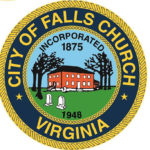 “The City of Falls Church is trying to help City businesses succeed through the pandemic with grants, special permits, and sharing resources and information,” Finarelli said in an email. “…The more businesses and non-profits than can benefit, the better for the entire community.”
“The City of Falls Church is trying to help City businesses succeed through the pandemic with grants, special permits, and sharing resources and information,” Finarelli said in an email. “…The more businesses and non-profits than can benefit, the better for the entire community.”
Approved Rebuild VA applicants may receive grants of three times their average monthly recurring eligible operating expenses, plus COVID-related expenses, up to a maximum of $100,000. Applicants who have received CARES Act funding are not eligible to receive reimbursement for COVID-related expenses under the Rebuild VA grant.
Eligible recurring operating expenses include:
- Payroll and benefits
- Mortgage payments
- Rent or Lease payments
- Utilities
- Principal and interest payments for business loans incurred before or during the emergency
Eligible COVID-related operating expenses, made on or after March 24, include:
- Expenses to comply with safety standards relating to COVID-19 prevention
- Expenses to reconfigure business facilities to comply with physical distancing standards, including the installation of drive-through windows
- Expenses for using or phasing-in touch-free technology or equipment
- Purchase of equipment, infrastructure, technology or other services to prepare for and respond to coronavirus
- Purchase of equipment, infrastructure, technology or other capital assets to prevent transmission and provide a healthy and safe work environment
An application guide can be viewed here. A list of required documents can be viewed here.
Photo via Governor of Virginia/Facebook
As Deirdre Johnson and Maurice “Mo” B. Springer join the Board of Directors at ArtsFairfax, they join an organization in the middle of transforming to adapt to the art scene changing to survive the aftermath of the COVID-19 pandemic.
ArtsFairfax, founded in 1964 as a nonprofit supporting local arts and artists, is embroiled in an overhaul of its programming to support a community reeling from the health and financial impact of COVID-19. All funding has been reallocated to emergency relief and raising funds for grants to local artists. With the pandemic leaving many businesses closed, the organization has also started to look at more opportunities to use empty storefronts as temporary art centers.
Johnson, the vice president and asset manager of Federal Realty Investment Trust, has worked in real estate since 1992. Johnson pointed to the McLean Project for the Arts moving into 1446 Chain Bridge Road, a strip mall, as an example of how ArtsFairfax can adapt to utilize existing, vacant spaces.
“A more recent example is Traveling Players space in Tysons Corner Center which opened before COVID,” Johnson said. “From the mall’s perspective, TPE is attracting customers – teens and their families – and they are activating an unused space. Both of these are interim uses, and the term impacts the type of use. We have also seen pop-up/weekend uses for art exhibits and theatre performances.”
Johnson also highlighted the symbiotic nature of art and local businesses.
“For Federal Realty, art has never been more important than it is today for shopping centers,” Johnson said. “Integrating art, design and performance touches people’s lives, increases educational opportunities and provides economic impact. Vacant spaces are a fabulous opportunity to showcase art right in the heart of a community which is its neighborhood shopping center.”
Springer is the President and CEO at Cardinal Insurance and Financial Inc., where he provides expertise in insurance and retirement options for his customers. Springer said the recovery from the pandemic has shown that ArtsFairfax can adapt and change as the situation requires.
“I don’t view ArtsFairfax as a static and myopic organization and as such I see the recovery from the pandemic given the initiatives in place particularly the strategies focused on engaging the community and the artist at large as a demonstration of the agility of the organization to satisfy the insatiable need of the arts community,” Springer said. “Its online programs, fund raising efforts to support the arts and the institution of viable programs to accommodate and support the new normal artist are facing are benefactors coming out of [COVID-19].” Read More
The City of Falls Church announced today (Monday) that they will allocate $44,000 in Arts and Humanities grants.
Five proposals were reviewed by the program and will receive a total of $21,200, with each project being fully funded. Five proposals received operational grants with $27,300 awarded.
Recipients include:
- Creative Cauldron: two grants include $5,000 in funding for “Live at the Cauldron” and an operational grant for administration, utilities, and facility overhead
- Falls Church Arts: the $4,200 grant will increase web capabilities with a new easy to navigate website and an operational grant will help with gallery rental
- Tinner Hill Heritage Foundation: two grants will help create promotional, publicity and marketing materials for the 2021 Tinner Hill Blues Festival along with an operational grant for administrative and general expenses
- The Little City CATCH Foundation: grants include funding for Watch Night and an operational grant for professional services, storage space, office supplies and website costs
- Washington Sinfonietta: two grants include a free holiday concert at Falls Church Episcopal Church and an operational grant to cover their annual insurance premium
Photo via Creative Cauldron/Facebook
Fairfax County to Receive an Additional $4.85 Million in CARES Act Funding— “Through this final allocation, Fairfax County will receive an additional $4.85 Million in federal funding to assist residents facing higher risk of eviction and help combat the economic hardships brought on by the COVID-19 pandemic.” [Fairfax County]
3 F.C. Council Candidates Appear at First Joint Campaign Event — “A new breed of candidates for public office has surfaced in the race to temporarily fill a vacancy on the Falls Church City Council.” [Falls Church News-Press]
D.C. Restaurants Turn to Pop-up Concepts to Stay Afloat — “Bethesda’s URBNmarket is bringing a socially distant Oktoberfest event to Tysons on Oct. 9 and 10 with seasonal beverages in the pop-up biergarten.” [Washington Business Journal]
McLean Mom Plans Meal Packing Efforts During Pandemic — “Through her LiftLikeAMother Amplify program, McLean’s Alicia McKenzie coordinates meal packing efforts to help those in need.” [Patch]


